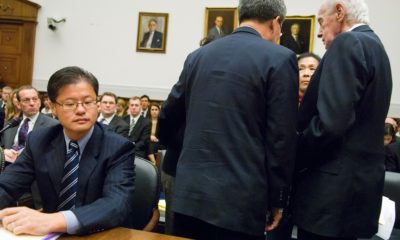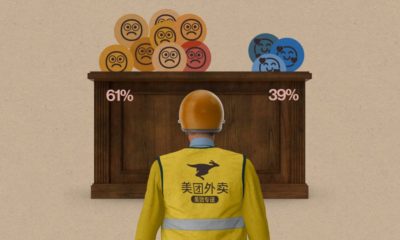Politics
China Cracks Down on Drone Exports in Wake of Ukraine War
Published
10 months agoon
By
Drew Simpson
Companies like DJI Technology Co. in China have propelled the country to the forefront of the global drone industry. China’s technological prowess and low prices have made the country a global leader in the drone industry. Concerns about the possible military use of drones have been heightened in light of the current conflict in Ukraine.
Concerns about the potential use of civilian drones for military purposes have been brought to light by the ongoing conflict in Ukraine, which has now lasted for over 17 months. According to reports, both sides in the conflict have been using drones made in China for reconnaissance and possibly attacks. As a result, the government in China has taken measures to stop civilian drones from being turned into weapons.
As of right now, China is restricting the export of certain types of drones in an effort to keep them from being used for “non-peaceful purposes.” These restrictions apply to drones that meet certain criteria, such as being able to fly beyond the operators’ line of sight, staying in the air for longer than 30 minutes, having attachments that can throw objects, or weighing more than 7 kilograms (1512 pounds).
The Chinese Ministry of Commerce issued a statement explaining the rationale behind these export restrictions. There was a warning about the potential for civilian drones with advanced features to be misused for military purposes. The ministry emphasized China’s stance against the military’s use of civilian drones and framed the increase in drone regulation as a responsible move by a major power.
As a precautionary measure in the wake of the crisis in Ukraine, some Chinese civilian drone companies have voluntarily halted all operations in hotspots. This action demonstrates their dedication to preventing their drones from being used in conflict. On the other hand, the Chinese government has claimed that the United States and Western media have spread lies about Chinese drone exports.
In April of 2022, DJI Technology Co., a major player in the drone industry, announced that it would be leaving the Russian and Ukrainian markets to prevent its drones from being used in armed conflict. The company’s decision to distance itself from any potential military applications and emphasize responsible use of its products is reflected in this move.
U.S. intelligence reports that Beijing may have provided equipment with potential military applications to the Russian military has cast a shadow of suspicion over China’s economic and trade cooperation with Russia. Chinese officials have defended their country’s business ties to Russia, calling them “normal economic and trade cooperation.” The report, however, does raise concerns about the fallout that could result from China’s backing of the Russian government’s military operations.
If China keeps backing Russia’s war effort in Ukraine, the Biden administration has threatened unspecified consequences. There is no indication in the recent report as to which specific trade between China and Russia would result in retaliation from the United States, but it does highlight the potential diplomatic tensions that could arise from China’s involvement in the conflict.
The Chinese government’s position on the conflict in Ukraine is consistent with its long-held policy of not meddling in the affairs of other countries. Chinese officials have publicly backed Russian justifications for the attack and blocked efforts to censure Russia at the UN. Recent export restrictions on drones, however, show that China is serious about acting responsibly as a global power.
China must strike a balance between protecting its economic interests as a leading drone manufacturer and upholding its global responsibilities as a responsible major country, as evidenced by its decision to impose export controls on civilian drones.
China hopes to show its dedication to world peace and stability by taking steps to stop the misuse of drones for military purposes. It remains to be seen what effect these limitations will have on China’s drone industry and international relations, but it is clear that China is acting to address concerns brought to light by the conflict in Ukraine.
It will become increasingly important for all parties involved to strike a balance between advancing technology and compromising global security as the situation develops.
First reported on AP News
Frequently Asked Questions
What has propelled China to the forefront of the global drone industry?
China’s technological prowess and competitive pricing have made it a global leader in the drone industry, with companies like DJI Technology Co. playing a significant role.
How has the conflict in Ukraine raised concerns about the use of civilian drones for military purposes?
Both sides in the conflict have been using drones made in China for reconnaissance and potentially for attacks, leading to concerns about civilian drones being turned into weapons.
How is China addressing concerns about the military use of civilian drones?
As a precautionary measure, China is restricting the export of certain types of drones that have advanced features, aiming to prevent their use for “non-peaceful purposes.”
What criteria do the export restrictions on drones in China apply to?
The restrictions apply to drones that can fly beyond the operators’ line of sight, stay in the air for over 30 minutes, have attachments to throw objects, or weigh more than 7 kilograms.
What has been the Chinese government’s stance on the military use of civilian drones?
The Chinese Ministry of Commerce has emphasized China’s stance against the military use of civilian drones and framed the increase in drone regulation as a responsible move by a major power.
How has DJI Technology Co. responded to the conflict in Ukraine?
In response to concerns about military applications, DJI Technology Co. announced it would leave the Russian and Ukrainian markets to prevent its drones from being used in armed conflict.
What concerns have been raised about China’s economic and trade cooperation with Russia?
U.S. intelligence reports have suggested that Beijing may have provided equipment with potential military applications to the Russian military, raising concerns about China’s involvement in the conflict.
How is China’s position on the conflict in Ukraine consistent with its foreign policy?
China’s position aligns with its long-held policy of not interfering in other countries’ affairs, as it has publicly backed Russian justifications for the attack and blocked efforts to censure Russia at the UN.
What does China’s decision to impose export controls on civilian drones demonstrate?
China’s decision shows its dedication to world peace and stability by taking steps to prevent the misuse of drones for military purposes while balancing its economic interests as a leading drone manufacturer.
What remains to be seen regarding the impact of the export restrictions?
It is yet to be determined how these limitations will affect China’s drone industry and its international relations, but they demonstrate China’s response to concerns arising from the conflict in Ukraine.
Featured Image Credit: Unsplash
Brad Anderson
Editor In Chief at ReadWrite
Brad is the editor overseeing contributed content at ReadWrite.com. He previously worked as an editor at PayPal and Crunchbase. You can reach him at brad at readwrite.com.
You may like
-


The Download: carbon removal concerns, and Yahoo’s China controversy
-


Yahoo’s decades-long China controversy and the responsibility of tech companies
-


The Download: Yahoo’s misdeeds in China, and AI Act takeaways
-


Inside the decades-long fight over Yahoo’s misdeeds in China
-


Chinese apps are letting public juries settle customer disputes
-


Users are doling out justice on a Chinese food delivery app
Politics
Fintech Kennek raises $12.5M seed round to digitize lending
Published
7 months agoon
10/11/2023By
Drew Simpson
London-based fintech startup Kennek has raised $12.5 million in seed funding to expand its lending operating system.
According to an Oct. 10 tech.eu report, the round was led by HV Capital and included participation from Dutch Founders Fund, AlbionVC, FFVC, Plug & Play Ventures, and Syndicate One. Kennek offers software-as-a-service tools to help non-bank lenders streamline their operations using open banking, open finance, and payments.
The platform aims to automate time-consuming manual tasks and consolidate fragmented data to simplify lending. Xavier De Pauw, founder of Kennek said:
“Until kennek, lenders had to devote countless hours to menial operational tasks and deal with jumbled and hard-coded data – which makes every other part of lending a headache. As former lenders ourselves, we lived and breathed these frustrations, and built kennek to make them a thing of the past.”
The company said the latest funding round was oversubscribed and closed quickly despite the challenging fundraising environment. The new capital will be used to expand Kennek’s engineering team and strengthen its market position in the UK while exploring expansion into other European markets. Barbod Namini, Partner at lead investor HV Capital, commented on the investment:
“Kennek has developed an ambitious and genuinely unique proposition which we think can be the foundation of the entire alternative lending space. […] It is a complicated market and a solution that brings together all information and stakeholders onto a single platform is highly compelling for both lenders & the ecosystem as a whole.”
The fintech lending space has grown rapidly in recent years, but many lenders still rely on legacy systems and manual processes that limit efficiency and scalability. Kennek aims to leverage open banking and data integration to provide lenders with a more streamlined, automated lending experience.
The seed funding will allow the London-based startup to continue developing its platform and expanding its team to meet demand from non-bank lenders looking to digitize operations. Kennek’s focus on the UK and Europe also comes amid rising adoption of open banking and open finance in the regions.
Featured Image Credit: Photo from Kennek.io; Thank you!
Radek Zielinski
Radek Zielinski is an experienced technology and financial journalist with a passion for cybersecurity and futurology.
Politics
Fortune 500’s race for generative AI breakthroughs
Published
7 months agoon
10/11/2023By
Drew Simpson
As excitement around generative AI grows, Fortune 500 companies, including Goldman Sachs, are carefully examining the possible applications of this technology. A recent survey of U.S. executives indicated that 60% believe generative AI will substantially impact their businesses in the long term. However, they anticipate a one to two-year timeframe before implementing their initial solutions. This optimism stems from the potential of generative AI to revolutionize various aspects of businesses, from enhancing customer experiences to optimizing internal processes. In the short term, companies will likely focus on pilot projects and experimentation, gradually integrating generative AI into their operations as they witness its positive influence on efficiency and profitability.
Goldman Sachs’ Cautious Approach to Implementing Generative AI
In a recent interview, Goldman Sachs CIO Marco Argenti revealed that the firm has not yet implemented any generative AI use cases. Instead, the company focuses on experimentation and setting high standards before adopting the technology. Argenti recognized the desire for outcomes in areas like developer and operational efficiency but emphasized ensuring precision before putting experimental AI use cases into production.
According to Argenti, striking the right balance between driving innovation and maintaining accuracy is crucial for successfully integrating generative AI within the firm. Goldman Sachs intends to continue exploring this emerging technology’s potential benefits and applications while diligently assessing risks to ensure it meets the company’s stringent quality standards.
One possible application for Goldman Sachs is in software development, where the company has observed a 20-40% productivity increase during its trials. The goal is for 1,000 developers to utilize generative AI tools by year’s end. However, Argenti emphasized that a well-defined expectation of return on investment is necessary before fully integrating generative AI into production.
To achieve this, the company plans to implement a systematic and strategic approach to adopting generative AI, ensuring that it complements and enhances the skills of its developers. Additionally, Goldman Sachs intends to evaluate the long-term impact of generative AI on their software development processes and the overall quality of the applications being developed.
Goldman Sachs’ approach to AI implementation goes beyond merely executing models. The firm has created a platform encompassing technical, legal, and compliance assessments to filter out improper content and keep track of all interactions. This comprehensive system ensures seamless integration of artificial intelligence in operations while adhering to regulatory standards and maintaining client confidentiality. Moreover, the platform continuously improves and adapts its algorithms, allowing Goldman Sachs to stay at the forefront of technology and offer its clients the most efficient and secure services.
Featured Image Credit: Photo by Google DeepMind; Pexels; Thank you!
Deanna Ritchie
Managing Editor at ReadWrite
Deanna is the Managing Editor at ReadWrite. Previously she worked as the Editor in Chief for Startup Grind and has over 20+ years of experience in content management and content development.
Politics
UK seizes web3 opportunity simplifying crypto regulations
Published
7 months agoon
10/10/2023By
Drew Simpson
As Web3 companies increasingly consider leaving the United States due to regulatory ambiguity, the United Kingdom must simplify its cryptocurrency regulations to attract these businesses. The conservative think tank Policy Exchange recently released a report detailing ten suggestions for improving Web3 regulation in the country. Among the recommendations are reducing liability for token holders in decentralized autonomous organizations (DAOs) and encouraging the Financial Conduct Authority (FCA) to adopt alternative Know Your Customer (KYC) methodologies, such as digital identities and blockchain analytics tools. These suggestions aim to position the UK as a hub for Web3 innovation and attract blockchain-based businesses looking for a more conducive regulatory environment.
Streamlining Cryptocurrency Regulations for Innovation
To make it easier for emerging Web3 companies to navigate existing legal frameworks and contribute to the UK’s digital economy growth, the government must streamline cryptocurrency regulations and adopt forward-looking approaches. By making the regulatory landscape clear and straightforward, the UK can create an environment that fosters innovation, growth, and competitiveness in the global fintech industry.
The Policy Exchange report also recommends not weakening self-hosted wallets or treating proof-of-stake (PoS) services as financial services. This approach aims to protect the fundamental principles of decentralization and user autonomy while strongly emphasizing security and regulatory compliance. By doing so, the UK can nurture an environment that encourages innovation and the continued growth of blockchain technology.
Despite recent strict measures by UK authorities, such as His Majesty’s Treasury and the FCA, toward the digital assets sector, the proposed changes in the Policy Exchange report strive to make the UK a more attractive location for Web3 enterprises. By adopting these suggestions, the UK can demonstrate its commitment to fostering innovation in the rapidly evolving blockchain and cryptocurrency industries while ensuring a robust and transparent regulatory environment.
The ongoing uncertainty surrounding cryptocurrency regulations in various countries has prompted Web3 companies to explore alternative jurisdictions with more precise legal frameworks. As the United States grapples with regulatory ambiguity, the United Kingdom can position itself as a hub for Web3 innovation by simplifying and streamlining its cryptocurrency regulations.
Featured Image Credit: Photo by Jonathan Borba; Pexels; Thank you!
Deanna Ritchie
Managing Editor at ReadWrite
Deanna is the Managing Editor at ReadWrite. Previously she worked as the Editor in Chief for Startup Grind and has over 20+ years of experience in content management and content development.
